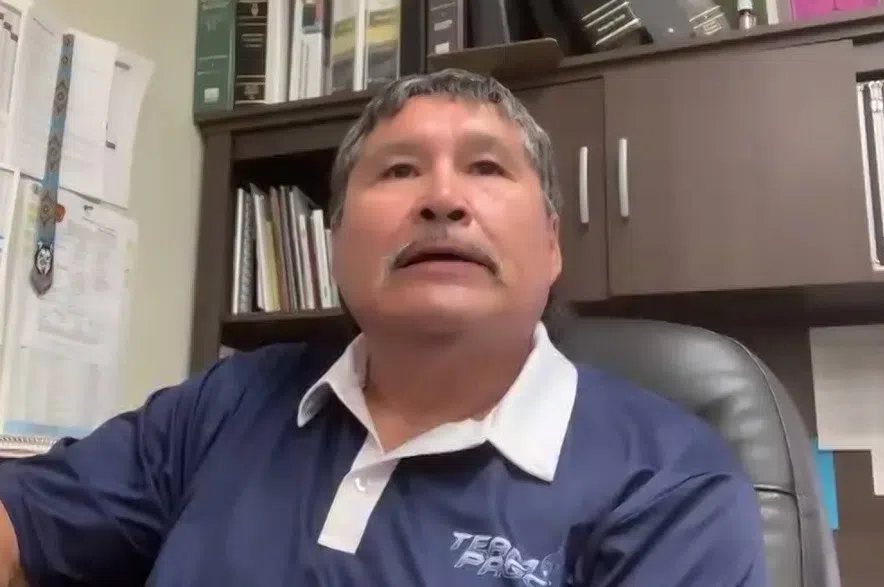As hundreds of people leave their homes in Sandy Bay just ahead of an approaching wildfire, local leaders are frustrated over the need for it.
“It’s really frustrating — frustrating again that we’re experiencing (this), our elders have to be evacuated,” said Prince Albert Grand Council Chief Brian Hardlotte.
The Flanagan fire was getting close to Sandy Bay and the Peter Ballantyne Cree Nation (PBCN) so it was advised the communities evacuate.
The fire is between 110 and 130 sq km and Duane Hiebert, Emergency Response Manager at PBCN, said on Wednesday afternoon that it was about seven kilometres away from the community.
PBCN Chief Peter Beatty said the community has had evacuations on almost a yearly basis, and blamed it on the way the province tackles wildfires.
Beatty, Hardlotte, and Hiebert spoke Wednesday about a change made years ago where they say the provincial government, instead of tackling fires when they’re smaller and putting them out, will monitor a fire and let it burn as a cost-saving measure.
“People report a fire and the response from the Saskatchewan Public Safety Agency is ‘we’re monitoring the fire’. We hear that a lot and we don’t want to hear that, we want to hear that there’s boots on the ground. Or, ‘can you get some Type 3 firefighters from the community and get them ready,'” said Hardlotte.
The leaders say there are many firefighters in their communities ready and willing to work, and they want the fires attacked as they come up.
Hiebert said the Flanagan fire has been burning for weeks and there was lots of time early on to address it.
“It hasn’t always been burning as vigorously as it has in the past couple days. They had ample opportunity to provide Type 1, Type 2 or Type 3 along various parts of the fireline to contain the fire when it was much smaller. But they didn’t take advantage of it at that time, it wasn’t a priority fire for them,” said Hiebert.
Hardlotte said these aren’t just some remote fires that aren’t hurting anything.
“This is our home, our traditional territory, our sacred land. And to let the land burn without doing anything or everything possible that could be done to extinguish, to suppress the fires — that’s unforgiven, that’s unacceptable, and to me that’s a betrayal of trust,” said Hardlotte.
He said the people in the north deserve better and that the provincial government’s policy needs to change.
Beatty said he’d had a short conversation with Policing and Public Safety Minister Paul Merriman earlier on Wednesday and he felt that it was positive.
From Public Safety
In its response to the frustrations the local leaders expressed earlier, the Saskatchewan Public Safety seemed to argue that it has been tackling the fires in that area.
The agency didn’t provide anyone for an interview, only sending out a written statement.
The statement said the agency has been actively suppressing the Flanagan fire since July 10, though it’s still not contained. It said Type 1, 2 and 3 firefighting crews have been working on the fire, as well as helicopters and air tankers.
It said the fire began to pose a risk to the community on Aug. 4 when it breached containment lines.
“The SPSA is putting all possible resources toward wildfire suppression efforts,” read the statement.
It said there have been 713 “working days of service” on the fire including staff and Type 2 firefighters, and with 263 working days of service for Type 3.
For this fire, the SPSA said it’s used 11 Type 2 crews from Deschambault, La Ronge, Pelican Narrows, Red Earth, Sandy Bay, Shoal Lake and Wahpeton.
Evacuees
On the recommendation of the SPSA and their leadership, people started leaving Sandy Bay and nearby communities on Tuesday – with 164 people in Prince Albert, 140 in Saskatoon in four hotels, and two people in Regina as of Wednesday afternoon. Hiebert said more buses would be running to get people out Wednesday evening and on Thursday, and was hoping to get everyone out who wanted to be out that day.
“(Thursday) is the day public safety agency has indicated may be the day where the fire moves straight towards the community with the wind’s change in direction and the temperatures,” said Hiebert.
He said no one wanted to leave the community and it was terribly upsetting for them – being taken out of their home and put in a strange environment.
The Prince Albert Grand Council (PAGC) and Peter Ballantyne Cree Nation, which is a member of the PAGC, have been working with the Red Cross on emergency services for the members, as opposed to with the SPSA.







